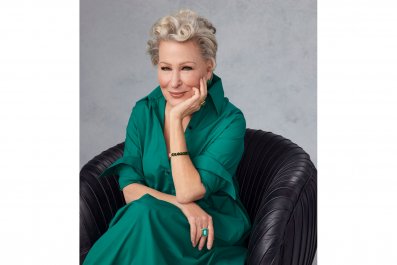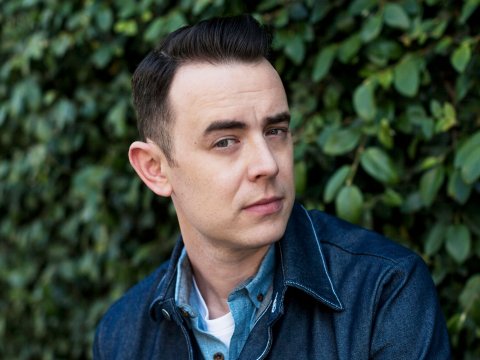
"You don't have to understand someone's faith to understand when someone is preying upon their weaknesses."
For Colin Hanks, playing Bob Broberg, the father of a girl abducted twice by the same man, in A Friend of the Family (Peacock, October 6), was an "exercise in going completely 100 percent out of my comfort zone." Based on the true story of Jan Broberg, who also produced the limited series, the show lays out in heavy and disturbing detail how the Broberg family, starting in 1972, fell prey to the predatory actions of Robert "B" Berchtold (played by Jake Lacy). "There's a lot of stuff that Bob did that is unfortunate and questionable. So I just did everything I could to try and explain why Bob made all those decisions." What makes this story unique is how "B" used Bob and his wife's (played by Anna Paquin) Mormonism against them. Hanks says Bob was "very much a man conflicted on a number of levels," but that shouldn't stop viewers from empathizing with him. "You don't have to understand someone's faith to understand when someone is preying upon their weaknesses, from an emotional standpoint."
SUBSCRIBE TO THE PARTING SHOT WITH H. ALAN SCOTT
ON APPLE PODCASTS OR SPOTIFY
What did you think of this story when you dug a little deeper into it?
My introduction to the story was actually through the first three scripts, and then I heard about the documentary [Abducted in Plain Sight on Netflix]. It is such a complicated story, between this family, this husband and wife and daughter and the other two daughters as well, and this man, and it's odd. People say, what's the show about? And I say, well, it's about a man who kidnaps a young girl twice. But like, that's not even the craziest part of the story. I think the show has a little bit of an advantage that the documentary did not have, because we have the time to be able to tell it in detail. There's so much that happens. And you just want to know why did this happen? Why did these people make these decisions?
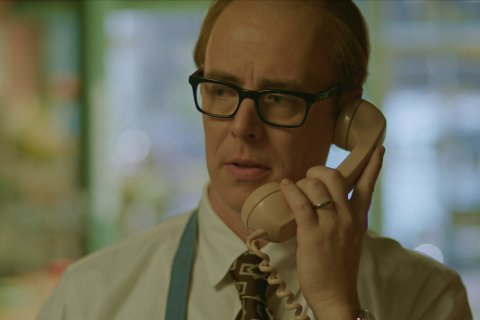
How do you find this balance between playing the character authentically, while also finding your own way to put your stamp on it?
To be honest, playing Bob Broberg has really been an exercise in going completely 100 percent out of my comfort zone. From the moment I read the script, there was so much that made me not want to do the job and maybe not take it on. There's the man's Mormon faith, which a lot of people have a hard time understanding. There's his own sexuality, for lack of a better term. He's very much a man conflicted on a number of levels. All of these components, I was just overwhelmed with fear, there's no way that I could possibly be able to convey any of those things. Then I just sort of looked at myself and said, "Well, yeah, so that's what this job is going to be, so go for it." I grasped at the straws to try and figure out what I could do to bring Bob to life. The crutches that I leaned on the most were obviously the hair and the look, this was definitely a chance for me to really get lost in the look of a character, which I've not often had the chance to do. So that was something I said, "Okay, well, that's exciting. I like that." And then I did a bunch of research about Mormons and their history and their faith and their outlook on the world and their relationships amongst each other and their family. I found a lot of positive in that and found some other stuff that was up for discussion. There's not a scene in the series in which I looked at the scene and said, "Okay, what would I do?" I had to say, "What is Bob thinking in this moment? How would Bob react?" I did everything I could, I filled my trailer with Mormon affirmations, I picked cologne that was of the era, literally anything I could to feel like I had done enough work so that when I was on the stage, I could just worry about the text and the emotions and know that everything else was there. Ultimately, the one thing we do have in common is that we're both fathers, we're both incredibly protective of our daughters. There's a lot of stuff that Bob did that is unfortunate and questionable. So I just did everything I could to try and explain why Bob made all those decisions.
Bob is dealing with so much, attempting to be the father and provider but also being a victim of Berchtold.
Oh, absolutely. There's a lot about the Mormon family dynamic, if you will, in terms of the patriarch of the family and very specific rules, and how we feel about those rules is another conversation to be had, but that is the fact of how those households back then. This is 1972 that this begins. This is a husband and wife who have three daughters. They're seemingly very idyllic. He's a florist, she's a stay-at-home mom. There's the Mormon congregation they're very close to and become very close with this nice family who has moved in up the street. And then all of these predatory moments happened between "B" and the Brobergs, and it's very specific. He goes after the daughter, the wife and the husband and all three of the Brobergs are wrestling with their own issues. Bob's struggle with his own masculinity, his own status in the household, his status within the Mormon church was very important to him, all of those things are wrapped up in the why of every decision he made. There are a lot of bad decisions he made, but then there's the good decisions he made at the end. So it all makes for an incredibly detailed and rich story.
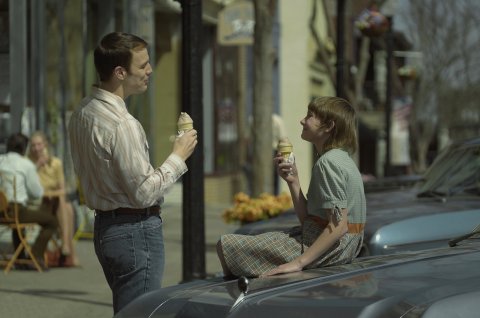
What did you learn about Mormonism during your research and did it change your outlook on Mormons in general?
I had a sort of very loose knowledge of Mormons. I knew generally their history, but I didn't know the specifics. I obviously studied up on the actual specifics of the history, where it was founded and the migration and all of those sorts of things, settlement in Utah and whatnot. And so there was this historical component. There were certain things that, obviously, stick out as very different, but then there are certain things where I go, "Okay, I can see what the equivalent is in other religions." What struck me the most was what emphasis there was on family, the idea that it is baked into their faith, that one night, you're gonna have a family night. Once I got into understanding just how important that family dynamic is, and seeing how it pertains to the Brobergs, that was incredibly helpful. And, as we got into the weeds of the story and really got into some dark, heavy stuff, it was very helpful to understand that this is one of the reasons why Jan Broberg would make the decisions she did, because she was taught at a very young age, you listen to what the older men say, they're gonna always tell you the truth. And here is a predator who took advantage of that. So all of these different components helped answer a lot of those "why?" questions for me so that I could at least understand why they made those decisions.
The show did a great job of finding that balance, asking the "why would they make these decisions" question and then really showing why they would.
Absolutely. I think overall what it came down to was the wants and needs and fears of Mary and Bob and how "B" preyed upon them. That's really where our focus is throughout the course of the season and as that's not too dissimilar from the documentary. Robert "B" Berchtold really preyed on Bob and his insecurities and the things that he was struggling with and emotionally blackmailed him, as he did with Mary Ann. You don't have to understand someone's faith to understand when someone is preying upon their weaknesses, from an emotional standpoint.
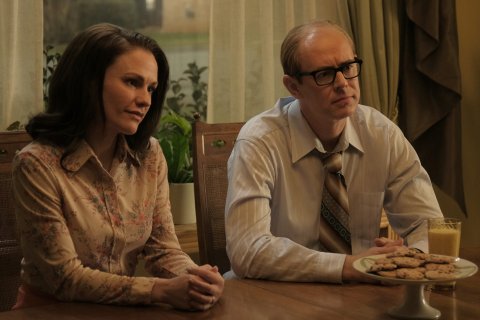
What was it like having access to Jan Broberg?
She was very helpful. When I got to Atlanta, she left me a note that was just the most loving, kind note. I arrived very scared as to what I was getting myself into and she said, "You are the exact perfect person to play my father, I couldn't be more excited. I'm here if you need me," and it was exactly what I needed, which was, you're exactly where you should be. I'm so happy to have you. I'm here. Have fun, go for it. And so I reached out to her on a few occasions and would just ask her if there were certain phrases that she remembered. I asked her what music she remembers hearing in the household growing up. But at that stage, I didn't want to get too into it with her. I felt like I knew the story, I had done a bunch of research, and I just wanted to let her and her family know that I was going to treat her father with the utmost respect and try and tell his story in a way that they would feel proud of.
And because she's an actress and has worked in entertainment, she probably understood your process.
I'm very, very grateful for her. Sometimes the actors just need to be told, "You're right where you should be. I'm here if you need help." So I was very fortunate.
It's been 20 years since Orange County, which is wild to think about. Do people still bring it up to you?
Oh, yeah. Look, you're bringing it up 20 years later. There's a lot of stuff I did 20 years ago that people aren't bringing up. So yeah, it's a special thing. What I loved about that film was it wasn't about getting invited to the party and it wasn't about hoping to get the girl, it wasn't about any of those trivial adolescent things, it was about a kid wanting to go to college and wanting a better life while at the same time not realizing the good life that he has. I remember thinking that then, and I think that is one of the reasons why that movie holds up as well as it does and I think it's the reason why we ended up having such a great cast while also being incredibly funny. Mike White wrote a very funny script that was probably one of the most fun scripts I've ever read. I've been able to do a couple of other things with Jake Kasdan recently. He's just such a talented director and knows how to really craft all those performances and have that big picture constantly in mind. So I'm incredibly fortunate to have been able to do it, and we are all incredibly fortunate that somehow people are still talking about this movie, so I'm just tickled by it.
Listen to H. Alan Scott's full conversation with Colin Hanks and Jan Broberg on Newsweek's Parting Shot. Available on Apple Podcasts, Spotify or wherever you listen to podcasts. Twitter: @HAlanScott




